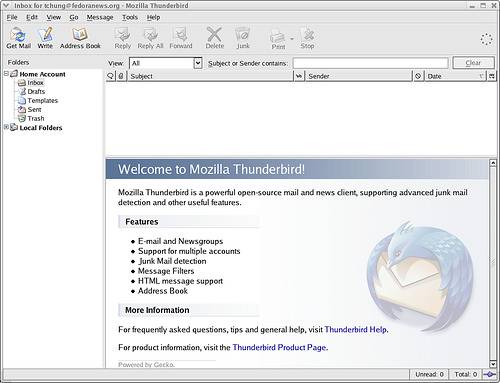Today Mozilla is launching a new organization to develop Internet mail and communications software. It will use the open source email desktop client Thunderbird as a base – the product, code and brand. Technically this will be a Mozilla Foundation subsidiary – and it is very similar to Mozilla’s Firefox effort. Just as Firefox aims to give choice in the browser space, this new initiative will try and advance email and communications technology. As with Firefox, the aim is to create a robust developer ecosystem to encourage open source development and community innovation. Mozilla will provide US$3 million seed funding to establish this new company.

The new organization will be led by Dr. David Ascher, currently CTO and VP Engineering of ActiveState, who joins Mozilla to carry out this job. Ascher has a lot of experience in the Mozilla community, going back to 2000. He was formally the
lead of Komodo, a Mozilla-based integrated development environment
(IDE), and is a director of the Python Software Foundation.
Simularities to Zimbra?
I spoke to Dr Ascher and Mitchell Baker, Chair of the Mozilla Foundation, earlier today about the news. The first thing I asked, given the big news about Zimbra being acquired by Yahoo today, is how similar are the aims of this new Mozilla organization to what Zimbra achieved? Zimbra made a name for itself as an innovative email and communications platform, so surely there will be similarities? Mitchell replied that there will be some similarities, but ultimately they are different – she said that Zimbra focused on using one workgroup server, so it was provider-centric. Thunderbird, said Mitchell, is user-centric as opposed to provider-centric – so they will aim to provide their email and communications services to multiple platorms. In fact, Mitchell said, Zimbra and Thunderbird could work very well together because Thunderbird could be used as a frontend for Zimbra.
There’s no word yet on what kind of features and functionality the new organization aims to release – or timeframes. However Dr Ascher and Baker told me that for many people, sole reliance on webmail is not suitable – they need a desktop client. So providing extra desktop/web functionality will be one of the goals going forward. The key thing, I was told, is that this is not like a commercial company with a single product; it’ll be a locus for community activity, although based on the Thunderbird product and code.
I also asked Mitchell if there would be any crossovers with Chandler, the open source PIM that has been years in the making (Baker is a member of the OSAF board, which leads the Chandler initiative). Mitchell told me not yet, but maybe in future.
Conclusion
Nothing will change for current Thunderbird users. Mozilla will continue to provide Thunderbird users with regular security and stability updates. For a full review of Thunderbird, see Read/WriteWeb’s post about Thunderbird 2.0 from April this year.
Image: piratis


















